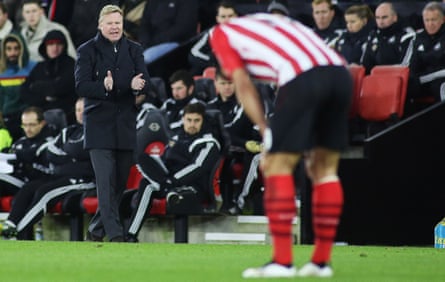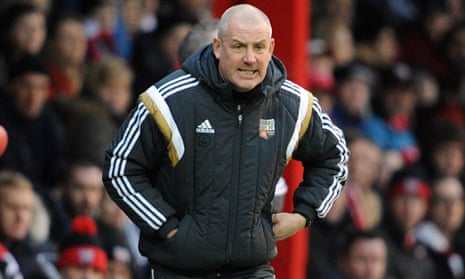There was a lot of fuss when Southampton sacked Nigel Adkins two years ago. It seemed a cruel decision at the time and, more damningly, an illogical one. Adkins had led Southampton back into the Premier League after two successive promotions and the news of his departure came two days after they had fought back from 2-0 down against Chelsea to claim a 2-2 draw at Stamford Bridge.
Yet Southampton were willing to be ruthless and, appreciative as they were for Adkins’ excellent work, they believed Mauricio Pochettino would take them to the next level. There was criticism but they stayed up and, though Pochettino has moved on, they are not doing too badly now.
That episode came to mind after reports that Brentford will part company with their manager, Mark Warburton, at the end of the season – a story that at first glance seems yet another vindication of why the chapter in Len Shackleton’s autobiography called “The Average Director’s Knowledge of Football” consisted of a single blank page. Warburton succeeded where his predecessor, Uwe Rösler, had failed, lifting Brentford out of League One last season, and now they are sixth in the Championship, six points below the automatic places. They are a likable team who play good football and it is difficult to know what more Warburton could have achieved, yet the likelihood is that not even promotion to the Premier League will be enough to save his job and so, inevitably, one wonders what Brentford think they are doing.
Well, perhaps they are thinking of the future. Simply going by Brentford’s performances this season Warburton does not deserve to be sacked. Rather he deserves their eternal gratitude and the freedom of west London. Yet there is more to this story than meets the eye. The word is that the club’s owner, Matthew Benham, wants to make a change because Warburton has disagreed with him about making additions to the coaching staff while there have been reports of talks with the Rayo Vallecano manager, Paco Jémez.
There is an innate mistrust in English football of what are perceived as interfering owners and it is rarely considered a good look for a club to speak to a manager about a position that is already filled. Leave the football to the football people. Give them money to spend and let them do their job.
Yet few people would argue that Benham does not have Brentford’s best interests at heart. He is a smart guy. He completed a physics degree and then went to work for a hedge fund in the City, before becoming a professional gambler. Benham set up a company, Smartodds, which sells statistics and tips to professional gamblers, and that allowed him to buy Brentford in 2012. He has invested almost £90m in the club since then and he is clearly an innovative man, always eager to find new ways of keeping unfashionable Brentford competitive.
It would be asinine to argue that Benham can do whatever he likes just because he owns Brentford, that there should be no scrutiny of his actions, yet surely he is providing an example that other clubs would do well to follow. Benham should be applauded both for preparing for the worst and for wanting to ensure that Brentford do not stand still. Many clubs suffer because they do not think in those terms and then, when a manager leaves, there is panic, as if they have forgotten that staying classy is not necessarily the best way to operate in a business as cut-throat and volatile as football.
Manchester City, for instance, were criticised in 2009 when it emerged that they were going to replace Mark Hughes with Roberto Mancini. Yet their main crime was bad PR, sending Hughes out to take charge of a game against Sunderland when everyone knew he was about to be ushered towards the exit, and ultimately it would have been negligent of City not to appoint Mancini, a superior manager who was ready to take over immediately. No one was talking about morals when City won the title for the first time since 1968.
Southampton also shrugged off the criticism when they sacked Atkins and brought in Pochettino, yet they avoided relegation comfortably and then finished eighth in the Argentinian’s first full season in charge; humble pie all round.
And then Pochettino left for Tottenham Hotspur last summer, supposedly leaving Southampton in turmoil. Managers do that. It works both ways and Brentford discovered that when Rösler left them for Wigan Athletic in December 2013. Their response was to turn to Warburton, who was their sporting director at the time, and promotion followed.
Southampton did not panic about Pochettino’s move to Tottenham because they already had the appropriate safeguards in place. They were ready, they knew what kind of manager would fit their template and, after assessing the candidates, they gave the job to Ronald Koeman. Southampton are fourth – some crisis.
In November Southampton invited journalists for a tour of their new state-of-the-art training ground and Les Reed, the club’s executive director of football, explained the careful recruitment process behind Koeman’s appointment.
“It wasn’t a coincidence,” Reed said. “It wasn’t a toss of a coin – ‘We’ll go for Koeman, oh, we’ve hit the jackpot.’ It was a profiling process. What coaches are out there who have the track record that says they’ve been successful at developing young dynamic teams and successful in playing a style which we could call the Southampton style?
“And who’s out there who can build on what Mauricio brought and then take it to another level? There were other candidates. But Ronald’s profile put him at the top of the list. Then you have to meet the man. It was clear from the first meeting I had with him that he fitted that profile in terms of his own personality and philosophy and the track record which we felt bolted on quite nicely to what we wanted.
“We had in Mauricio a fantastic coach, a great field coach, who had played in the World Cup, played at the top level with Argentina, Paris Saint-Germain and so on, and did an outstanding job for us. How do you replace that? Well, you find one who’s done that and also won the Champions League and won the league in the countries he’s coached in, but with the same profile: young, dynamic teams.
“The job he did at Ajax previously, and at Feyenoord recently, said if he’s the right personality, then he’s the right fit for the job. Where we hit the jackpot was getting the right guy with the right personality. That bit you don’t know about until you get to know them. He bought into everything. I think both of us saw an ability to hit the ground running.
“People were getting frustrated. ‘Club’s gonna implode, they can’t find a manager, who wants to go to Southampton when it’s all going to collapse?’ But it wasn’t. It was doing the same thing we do with players: due diligence, research, make sure you are going to make the right decision, not make a mistake.”
None of that happens overnight. One cannot click one’s fingers and hope a new manager arrives out of nowhere, yet that lack of direction is so damaging. Crystal Palace wasted half a season with Neil Warnock as manager after Tony Pulis’s sudden departure last summer. West Bromwich Albion sacked Steve Clarke in December 2013, eventually appointed Pepe Mel, replaced him with Alan Irvine and have finally ended up with Pulis. Fulham started last season with the avuncular Martin Jol, replaced him with René Meulensteen, an inexperienced dreamer, and eventually, inevitably, went down with the German disciplinarian, Felix Magath, as their manager.
Four years ago Aston Villa replaced Gérard Houllier with Alex McLeish, but only after being rejected by Roberto Martínez. Can you think of two managers who are less alike than Martínez and McLeish? And can you imagine that happening at Southampton? Not at the moment.
Reed said Southampton do not let prospective managers interview them. The entire set-up would be pointless if they did. Yet while Reed is given time, space and freedom to research managers, some clubs organise their structure in a curious order: manager first, director of football second. One Premier League club wants a director of football who would answer to the manager and who would not be in charge of scouting and transfers. One can only marvel at that logic.
Yet the role of the traditional manager is changing. Last season Southampton’s former executive chairman, Nicola Cortese, caused a mini-drama by saying that Pochettino was like any other department head, rather than an all-seeing, all-powerful figure who was in charge of every cough and sneeze at St Mary’s. It was an unusual comment in the context of English football but it was not a problem for Pochettino after his time in Spain.
While the cult of the manager is ingrained in our culture, the notion of anyone emulating Sir Alex Ferguson’s 27 years at Manchester United or Arsène Wenger’s 18 at Arsenal is almost unthinkable now. José Mourinho could match them if he decides to settle at Chelsea for a sustained period, yet he is a special case and the statistics show that the average duration of a manager is 2.32 years in the Premier League, 0.95 in the Championship, 1.88 in League One and 2.05 in League Two, which highlights why Brentford are right to be prepared.
Consider this: apart from Wenger, the only manager in England who has been at his club for more than five years is Paul Tisdale, who has been at Exeter City since 2006. Next on the list is Karl Robinson, who has been at MK Dons since May 2010, while Sam Allardyce – who will reach four years at West Ham United in June – is second to Wenger among Premier League managers.
Allardyce could have been sacked last summer and his contract is up at the end of this season. It is a fragile existence.


